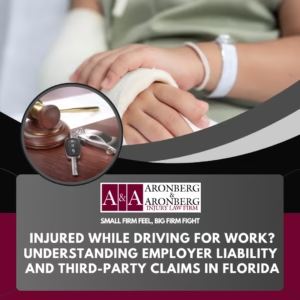
If you have been injured in a car accident while driving for work in Florida, the legal questions become more complex than in a typical motor vehicle collision. In addition to dealing with your own injuries, medical bills, and time away from work, you may be facing multiple potential sources of liability and compensation—including your employer, another driver, and your own insurance policy.
Understanding how employer liability and third-party claims function in Florida can help protect your rights and clarify your options. At Aronberg & Aronberg, we regularly assist injured individuals in navigating this intersection of personal injury and employment law.
Under Florida law, an employer may be held liable for injuries that occur while an employee is performing duties within the scope of employment. This legal principle is known as vicarious liability or respondeat superior.
If you were:
your employer may be responsible for damages resulting from the crash. This liability may extend to both your injuries and those of other parties involved.
However, if you were commuting to or from work, using your own vehicle for personal reasons, or otherwise outside the scope of employment at the time of the accident, your employer is less likely to be held accountable.
If your injury qualifies as work-related, you may be entitled to workers’ compensation benefits through your employer. These benefits typically cover:
Workers’ compensation is a no-fault system, which means you do not have to prove negligence to qualify. However, workers’ comp does not allow for pain and suffering damages and generally limits your ability to sue your employer directly.
This is where third-party personal injury claims may become relevant.
If someone other than your employer—such as another driver—was at fault for the crash, you may be able to file a third-party claim against them. This allows you to pursue damages beyond what workers’ comp provides, including:
A third-party claim operates like a typical personal injury case and requires establishing the other party’s negligence.
Florida follows a modified comparative negligence system. As of 2023, if you are found to be more than 50% at fault for the accident, you are barred from recovering damages from the other party. If you are less than 50% at fault, your compensation will be reduced proportionally to your degree of responsibility.
This makes it especially important to document the scene, gather witness accounts, and contact an attorney promptly after a crash—especially if it occurred while you were working.
It is not uncommon for someone injured in a work-related crash to have multiple concurrent claims:
Navigating this overlap can be complex. For example, your employer’s insurance carrier may seek reimbursement (subrogation) from your personal injury settlement for benefits they paid out. An experienced attorney can help coordinate these claims to maximize your recovery while ensuring all legal obligations are met.
If you were injured while driving for work, it is crucial to have the situation reviewed by a qualified personal injury attorney as soon as possible. Even if your employer is cooperative, there may be compensation available from other parties that you are not aware of.
At Aronberg & Aronberg, Injury Law Firm, we assist injured workers across Florida in untangling the legal and insurance issues that arise from work-related accidents. We work to ensure that every avenue of recovery is explored, and that your rights are protected throughout the process.
If you were injured while driving on the job, contact our office to schedule a consultation. We will help you determine who may be liable, what claims you can pursue, and what steps to take next.